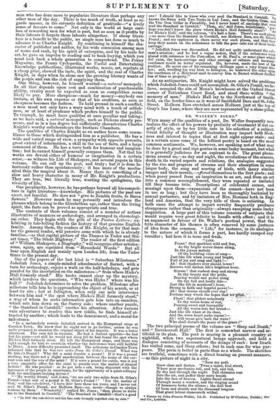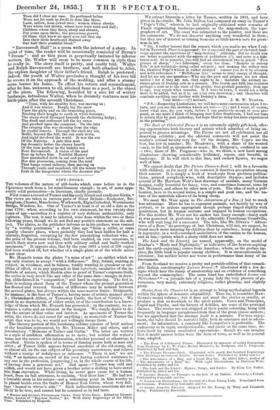DR. WALLER'S POEMS.* Wrrn many of the qualities of a
poet, Dr. Waller frequently neu- tralizes the effect of his powers by prolixity of treatment if not ex- actly of style, or by too little care in his selection of a subject. Great felicity of thought or illustration may impart both fresh- ness and interest to topics that at first sight appear stale; and in a certain sense some of the loftiest poetry is based on the most common sentiments. We, however, are speaking not of what may be done by a great and ripe genius in some lucky moment, but what it is generally judicious for an aspirant to do. The great pheno- mena around us,—as day and night, the revolutions of the seasons, death in its varied aspects and relations, the analogies suggested by the rise and progress of streams and their absorption in some larger body, the song and soaring of birds, with many similar images ana their morals,—effered themselves to the first poets; and when poesy passed from an inspiration to an art, and from an art into a common accomplishment, they were repeated or imitated till they became trite. Descriptions of celebrated scenes, and musings upon them—expansions of . the sonnet—have not been in use so long ; but they have been so thoroughly hacknied by annual poetasters, and by imitators of Mrs. Hemans• both in Eng- land and America, that the very title of them is satiating. In both cases the attempt to impart novelty frequently produces strangeness rather than originality—always excepting some lucky inspiration. A large part of this volume consists of subjects that would require very great felicity to handle with effect ; and it is an argument in favour of Dr. Waller's poetical power, that the trite character of his themes is often removed by some justness of idea from the common. " Life," for instance, in its analogies to the nature of which it forms a part, has hardly escaped any versifier ; but here it is terse and fresh.
"LIFE.
Fount ! that sparklest wild and free, As thy bright waves dance along, In the joyous melody
Of thy bubbling voice of song—
Just like life when young and bright, Full of joy and song and light !— Ah ! that shadows ever should lower !
Sorrows will darken life's brightest hour.
Stream ! that rushest deep and strong In thy beauty and thy pride, Bearing wealth and power along
On thy full and lordly tide—
Just like life in manhood's hour, Strong in faith and hopeful power !— Ah ! that storms should ever rise!
Fortune may wreck the hopes that we Flood ! that glidest noiselessly To thy ocean-home of rest, Pouring sweet and tranquilly
All thy waves into her breast—
Just like life when at its close,
And the worn heart seeks repose !—
Ah ! will ocean give back the wave ?
Who shall disturb the peace of the grave ?"
The two principal poems of the volume are " Sleep and, eath," and " Ravenscratt Hall." The first is somewhat narrow and ar- tificial in its plan. The poet is musing in a pleasant country at nightfall, when two supernatural beings approach, and hold a dialogue consisting of accounts of the doings of each : hord Death has visited some, and Sleep others ; but in each case for wise pur- poses. The poem is better in parts than as a whole. The sketches are truthful, sometimes with a direct bearing on present manners, —as this picture of night in a city.
"Soon my path
Grew close and darker. 'Twas a mean, foul street, Where poor mechanics toil, and toil, and toil, By day and through the night. Tall chimmes rose Into the air, and puffed their sooty breath Into the face of heaven. Lights flared abroad Through many a window, and the ringing sound Of hammers broke the silence ; the dull beat Of loom and shuttle and the thousand tongues That giant labour clamoureth • Poems by John Francis Waller, LL.D. Published by M`Glashan, Dublin; Orr and Co., London.
Then did I close my vase. Its perfumed balms Were not for such as dwell in dens like these, Lank, sallow, lean-jawed men ; women whose cheeks Were white and drawn, whose eyes were sunk and dull ; Children whose tiny faces, sharp and shrunk, Put years upon them; the precocious growth
Of those that knew no sport save toil that ate Into their little hearts and drained away
One half their youthful blood."
"Ravenscroft Hall" is a poem with the interest of a story. In point of tone, the reader will be occasionally reminded of Byron's "Dream ; and as this piece is perpetually imitated by inferior writers, Dr. Waller will seem to be more common in style than be really is. The story itself is pretty, and neatly told. Walter and Ralph Ravenscroft are brothers, and both attached to Alice, the orphan daughter of their father's friend. Ralph is preferred ; indeed, the youth of Walter precludes a thought of his love till he avows it on the approach of the wedding, and after a stormy scene. leaves his home. To effect his return and reconcilement, after be has, unknown to all, attained fame as a poet, is the object of the piece. The following, heralded by a nice bit of wintry landscape, introduces Walter, when he dreamily ventures near his birth-place after the seventh Christmas. "Time, with his stealthy feet, was moving on ; And it was winter. Deeply lay the snow Upon the glebe and on the branching pines, Bending their boughs to earth in white festoons; The sheep stood thronged beneath the sheltering hedge ; The finch and redbreast left the icy eaves And perched upon the casement. On the lake The crisping film was shooting from the edge In crystal lancets. Through the chill dry air, Redly, beyond the hill, the sun sank down, And night involved the world. It was the eve
Of the Nativity. A pale thin man Sat dreamily before the cheery hearth
Of the trim parlour in the hamlet inn Near Ravenscroft. A vision of the past
Rose up before him. Faithful Memory
Now marshalled forth in sad and pale array Her dim procession, coming from the mist That hangs round infancy, then moving on Through youth and manhood, till the mimic train Ends in the foreground where the dreamer sits."



































 Previous page
Previous page